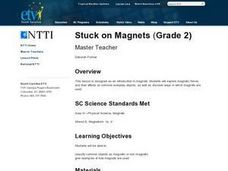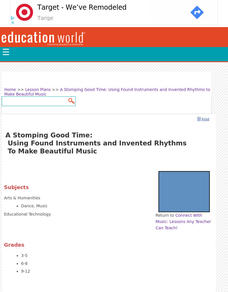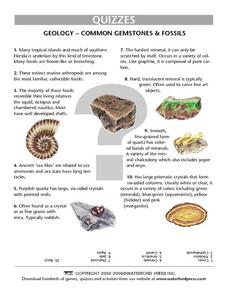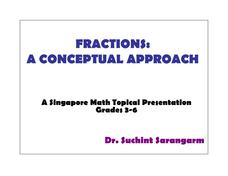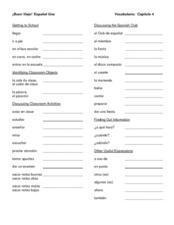Curated OER
Point Of View Poem
Students discuss a chapter from the book, The Phantom Toll Booth. They choose a common object and attempt to examine it from a different point of view. Using Kid Pix, students create a slide show for each line of their poem.
Curated OER
Stuck on Magnets
Second graders are introduced to magnets and magnetic forces. In groups, they discover which everyday materials are magnetic and their effect on other objects. Using the internet, they examine the various uses of magnets in the real...
Curated OER
A Stomping Good Time: Using Found Instruments and Invented Rhythms to Make Beautiful Music
Learners work in small groups to use everyday objects to create performances inspired by the work of STOMP. They create a system of notation to document the music and movement of a 2-minute performance.
Alabama Learning Exchange
Cosmic Measurements
Students develop two units of measurement to relate to the astronomical unit and the light year. In this astronomy instructional activity, students use a Twizzler to develop a measurement unit similar to the astronomical unit. They use a...
Curated OER
History In the House
Students analyze primary sources. In this historical analysis activity, students will closely examine the household objects that most impact their lives. Students will use research, analysis, and class discussion to draw parallels...
Curated OER
Magnify It!
Students view objects of various sizes from several viewing distances to discover that their visual field is limited. They record what they see and compare their observations with classmates. They conduct more structured experiments.
Curated OER
Understanding Fractions
Students explore the parts of an orange to develop an understanding of the addition and subtraction of fractions. The concept of representing parts of a whole by dividing an object into smaller pieces is experienced in this hands-on...
Curated OER
Magnets
Second graders classify objects and create hypotheses regarding their magnetic properties. They watch a video about magnets and finally use a magnet to test their hypotheses created earlier.
Curated OER
Grammar Skills
In this ESL worksheet, students complete a chart in order to create 10 complete sentences. The chart includes who/what, did what, to whom/what, how, where, when, and why.
Curated OER
Newton's 2nd Law
Fourth graders discuss Newton's Second Law of Motion, and the acceleration of fast and slow moving objects. They experiment with items with different masses to determine the effect mass has on acceleration using a toy car. They complete...
Curated OER
Some Common Chemical Reactions
In this chemical reactions worksheet, learners compare and contrast corrosion and combustion reactions. This worksheet has 15 short answer questions.
Curated OER
Commonly Mixed Pairs of Words
In this word meanings worksheet, learners practice choosing the correct word for the sentence. Students complete fifteen sentences by choosing the correct word for each sentence.
Curated OER
Common Gemstones and Fossils
In this science worksheet, 4th graders respond to questions pertaining to gems and fossils. Students answer ten questions which give clues and visual aids to assist in answering.
California Education Partners
Cady's Cats
How much can a cat eat? The five-question fraction assessment asks pupils to determine the fractional portion of a food box eaten by cats. Learners show their proficiency in adding and subtracting fractions using several scenarios...
Curated OER
Fractions: A Conceptual Approach
If you are teaching fractions to elementary learners this year, this Singapore Math presentation is essential to your curriculum. It addresses several basic fractions concepts in conceptual terms and figures, making each idea accessible...
Los Angeles County Office of Education
Assessment for the California Mathematics Standards Grade 3
Assess scholars' knowledge with a 22-page assessment that covers place value, patterns, probability, estimation, measurement, geometric figures; and their ability to add, subtract, multiply and divide proficiently.
Curated OER
Investigation - Mathematical Reasoning: Tables and Chairs
Fourth graders draw pictures and diagrams as they attempt to solve a mathematical problem involving the arrangement of eleven tables shaped like equilateral triangles and the seating of exactly twenty-five people.
Walters Art Museum
The Symbolism of Allegorical Art
Introduce learners to allegorical art with four bronze sculptures by Francesco Bertos. After modeling how to recognize bias and allegory in Bertos' Africa, class groups examine the other three sculptures in the series before creating...
Curated OER
Style and Voice
Develop the writing skills of your high school class. Writers consider their personal style and voice, read selections by other authors, and then write pieces that challenge them to experiment with their own style.
Curated OER
School Vocabulary and Expressions
Beginning Spanish speakers read the school related vocabulary and write the English translation for each word on the line provided. Although this worksheet was designed to accompany the Spanish classroom text ¡Buen Viaje!, you could...
Curated OER
Essay Writing
Are your learners working towards their GED? First they study the GED essay rubric, and then they read a sample essay as a group. After studying the basic elements, they write an essay of their own. After peer editing, they revise their...
Curated OER
Longest, Shortest, Tallest Worksheet
Kindergartners demonstrate their ability to compare objects with a measurable attribute in common. They determine which string in a series of boxes is the longest, which cherry tree is the tallest, and write these labels on the line...
Discovery Education
Sonar & Echolocation
A well-designed, comprehensive, and attractive slide show supports direct instruction on how sonar and echolocation work. Contained within the slides are links to interactive websites and instructions for using apps on a mobile device to...
Cornell University
Buoyancy
Swimmers know to float by turning their bodies horizontally rather than vertically, but why does that make a difference? In an interesting lesson, scholars explore buoyancy and the properties of air and water. They test cups to see which...

